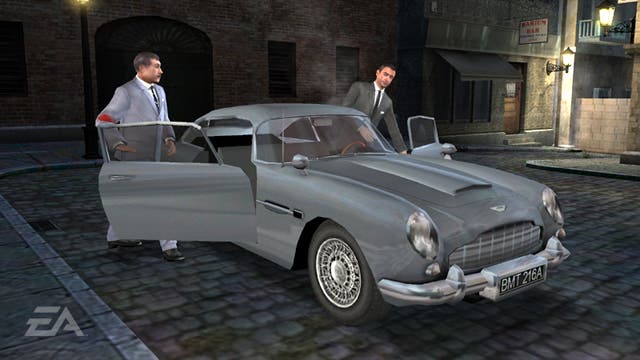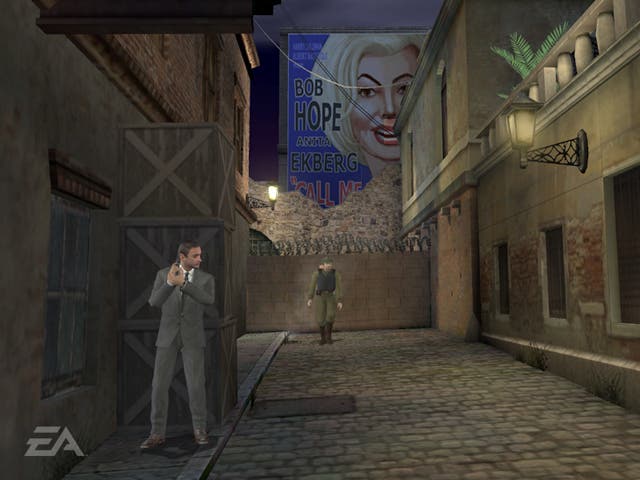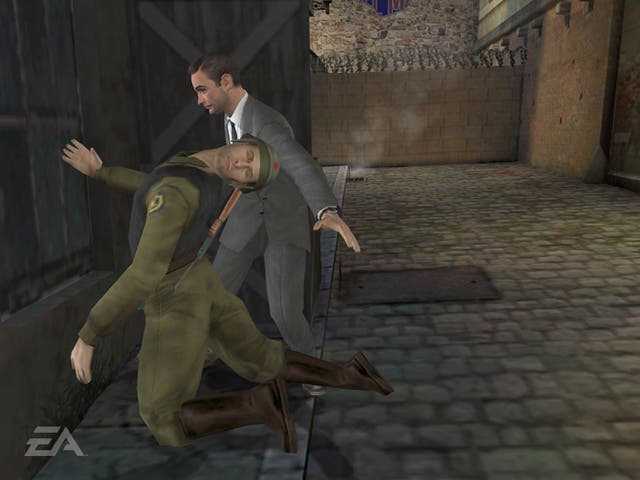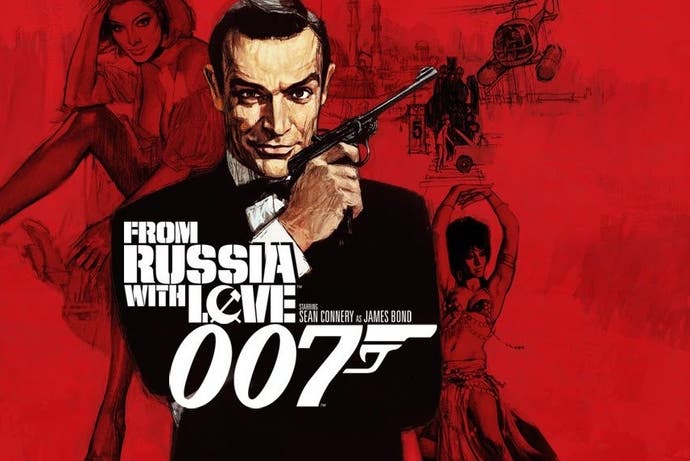For better or worse, From Russia With Love was vintage Bond
Sean's show.
As well as being forever on Her Majesty's secret service, a certain veteran MI6 agent has spent the last three decades carving out a lucrative second career, essentially freelancing on consoles and home computers. It says something about the durability and ubiquity of Bond, the great British brand, that very few of these 007 games seem to come out at the same time as one of the actual movies. Tee Hee, the towering, metal-clawed henchman from Live And Let Die, could count the number of official film tie-ins that have hit the correct release window on his one good hand.
Early Bond licence holders Domark set an industrious early example in the 1980s, cranking out cheap, cheerful 8-bit and 16-bit adaptations of A View To A Kill, The Living Daylights and Licence To Kill that hit shelves the same year those titles graced the big sign on your local Odeon. Since then, it's been a crapshoot, often with crap shooters. The N64's Goldeneye 007, the literal gold standard of Bond gaming, was released in 1997, two years after Pierce Brosnan's stunt double bungee-jumped off that dam. The follow-up Tomorrow Never Dies and The World Is Not Enough games missed their respective movies and accompanying marketing splurge by at least 12 months. Consciously or not, such digital dawdling creates a disconnect. Where Movie Bond disarms nuclear bombs with seconds to spare, Games Bond rocks up a year or two later and wonders why he's looking at an enormous crater where London used to be.
It's getting worse. Since Daniel Craig strapped on the shoulder-holster in 2006, only Quantum Of Solace - no-one's favourite Bond movie, unless they're using it in Scrabble - has managed to match up game and film, and half of it was a belated adaptation of Casino Royale. Bond's 50th anniversary blowout Skyfall was shadowed by 007 Legends, a well-meaning but botched greatest gaming hits. And the closest thing to an official tie-in for the looming Spectre, which surely must have a shot at being the biggest Bond movie of all time, is an asset-management tablet game from the developers of a popular Kim Kardashian Kardashi-app.

Does it really matter? In the age of Arkham, it feels like any half-decent IP should be able to carve out separate paths on film and joypad, co-existing without every having to crossover. To release an official Spectre game might pull in a few casual players - your dad, basically, or the army of slavish 007 superfans who bought the 50th anniversary Blu-ray set that came with an empty slot ready to receive Skyfall when it came out - but would it really be worth the hassle? (Especially when, on past evidence, Craig seems content to phone in his game-starring performances?)
That's what makes From Russia With Love, a game released in 2005 that went to extraordinary lengths to transport players back to the 1960s, such an outlier. It was looking back, way back, just as the gritty Craig era was about to kick off: a bon-bon before Bourne. It was also the last 007 game published by EA, who had approached their stewardship of the licence with a mercantile vigour that would have impressed even the late Cubby Broccoli. Presumably impatient at the rate the movies were being produced, EA launched an annual parade of pseudo-Bond games with titles like Nightfire and Everything Or Nothing. After splashing out a considerable sum to use the voice and digital likeness of Pierce Brosnan, EA were clearly determined to wring every last drop out of their investment - it wouldn't have been that surprising if they'd sneaked out a Thomas Crown Affair or Taffin game on the side.
When it become clear that Brosnan would not return as Bond on the big screen, EA halted their production line, briefly, to rethink, and ended up doing something at least vaguely similar to the Casino Royale movie reboot - looking backwards to try and to intuit a way to effectively move forward. It's unlikely that From Russia With Love was conceived as EA's final Bond game (they subsequently lost the licence to Activision) but it ended up being both a respectful tribute to the formative years of the character and an unmistakable monument to the publisher's slick, moneybags approach to game production and presentation.

The great coup, of course, was convincing big Sean Connery to reactivate his double-00 status. His extraordinary physical boxiness in the early Bond movies - that bodybuilder physique crammed into exquisitely tailored suits, a Caledonian Hercules with a panther prowl - made him a perfect avatar for the rendering capabilities of the PS2 era. The character model captured his physicality too: convincingly roughing up bad guys with authentically jerky karate chops and, just like in the classic title sequence, shooting exclusively from the hip.
Connery was approaching 75 when he recorded his dialogue for the game so, perhaps inevitably, it's a little shaky. But there's still something stirring about hearing the original Walther Scot revisit his signature role, even if for every classic "Bond, James Bond" there's a dozen fillers like "You stay here while I locate the blueprint". The game nods to the plot of the movie - a tense spy game featuring a Lektor decoding device, a Russian honeytrap and a frantic flight through eastern Europe - but wisely sponges up plenty of other classic Bond signifiers. By including the weaponised Aston Martin DB5 from Goldfinger and the space age jetpack from Thunderball, it feels like an attempt to evoke not just one movie but Connery's entire 007 career.
The typically polished EA presentation still stands up a decade later, though the gameplay feels much creakier. Lumbering through levels, it's only possible to target your gun when presented with an actual enemy, at which point an aiming reticule automatically locks on. By limiting your ability to interact with the game world, it becomes a strangely passive experience, even when the retro European locations are flooded with enemies. You do have the ability to target your shots within the reticule, and precise hits score flair points that eventually unlock upgrades. The mechanic also has its own instant rewards: shoot a grenade from a soldier's belt and it will drop to the floor and explode, a surprisingly gratifying and compelling challenge.

The driving sequences are shoddy but From Russia With Love soars any time it straps you in the jetpack, from the bolted-on pre-credits sequence that sees you playing missile tag with a helicopter buzzing round Big Ben to swooping through the Russian embassy in Istanbul scattering furniture and henchmen with your downdraft. There are also gadgets (an under-utilised laser watch, a remote-controlled Q-copter and a serum gun that turns enemies into juiced-up berserkers) and an early training level in Q's development lab that features retro robo-target dummies that are more fun to watch and shoot than most of the live enemies.
Aside from the odd difficulty spike, it feels like a very dad-friendly game, from the constant guiding hand of the aiming reticule to the cutscene focusing on the all-lady cat-fight at a gypsy camp. Cycling through weapons pauses the game mid-firefight - another touch dads might enjoy - and you can change into collected outfits whenever you like, from stealthy black polo necks to 007's dazzling white tux. But foremost among From Russia With Love's aesthetic achievements is the legitimately fantastic score. Composed by Christopher Lennertz, it's a superior, sustained John Barry tribute with luxurious full orchestra and an irresistible throwback jazziness that sells the period setting better than any of the production design.
A decade ago, despite EA's considerable marketing push, From Russia With Love felt a little bit out of step, its stylised illustrated box art like nothing else on the shelves. Maybe it would have fared better once Mad Men became a cultural phenomenon, reigniting our love of square pocket handkerchiefs and 1960s cool. But for an EA blockbuster title presumably mandated by a spreadsheet of profit forecasts, there is a tangible sense that this was a package assembled with love. It might have ended up a rather haphazard game - with an utterly superfluous Natasha Bedingfield cameo - but From Russia With Love remains a fitting cultural artefact to commemorate what will presumably be both EA and Connery's final Bond swan song. Still, like the big man might put it: never shay never again.


